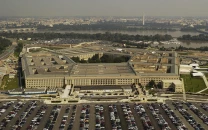Iran says US, UK, France will be targeted if they intervene
Tehran issued this warning to the US, UK and France over any potential involvement in intercepting Iranian attacks

Iran has warned the United States, United Kingdom and France that their bases and ships in the region will be targeted if they help stop Tehran's strikes on Israel, while calling continuing Iran-US nuclear talks ‘unjustifiable’ amid persisting Israeli attacks on the country.
Iran state media reported on Saturday that Tehran issued this warning to the US, UK and France over any potential involvement in intercepting Iranian attacks.
Meanwhile, Foreign Minister Abbas Araqchi on Saturday called the continuing Iran-US nuclear talks unjustifiable while "barbarous" Israeli attacks persist on the country.
Read More: Israel's Katz warns 'Tehran will burn' if missile strikes persist
On Friday, Iran's foreign ministry spokesperson Esmaeil Baghaei said the dialogue with the US over Tehran's nuclear programme is "meaningless" after Israel's biggest-ever military strike against Iran, accusing Washington of supporting the attack.
US President Donald Trump has lauded Israel's strikes and warned of much worse to come unless Iran quickly accepts the sharp downgrading of its nuclear programme that the US has demanded in talks that had been due to resume on Sunday.
But with Israel saying its operation could last weeks, and urging Iran's people to rise up against their Islamic clerical rulers, fears have grown of a regional conflagration dragging in outside powers.
The United States, Israel's main ally, helped shoot down Iranian missiles, two US officials said. "If (Supreme Leader Ayatollah Ali) Khamenei continues to fire missiles at the Israeli home front, Tehran will burn," Israeli Defence Minister Israel Katz said.
Iran and Israel traded missiles and airstrikes on Saturday, the day after Israel launched a sweeping air offensive against its old enemy, killing commanders and scientists and bombing nuclear sites in a stated bid to stop it from building an atomic weapon.
In Pictures: Iran’s retaliatory strikes on Israel
In Tehran, Iranian state TV reported that around 60 people, including 20 children, had been killed in an attack on a housing complex, with more strikes reported across the country. Israel said it had attacked more than 150 targets.
This number may differ from the Israeli count, as the ambulance service said three people, including a man and a woman, were killed and dozens wounded.
An Israeli official said Iran had fired around 200 ballistic missiles in four waves, and also claimed to have intercepted surface-to-surface Iranian missiles and drones, while two rockets were fired from Gaza.
In the western suburb of Ramat Gan, near Ben Gurion Airport, Linda Grinfeld described her apartment being damaged: "We were sitting in the shelter, and then we heard such a boom. It was awful."
Iran had vowed to avenge Friday's Israeli onslaught, which gutted Iran's nuclear and military leadership and damaged atomic plants and military bases. However, 20 months of war in Gaza and a conflict in Lebanon last year have decimated Tehran's strongest regional proxies, Hamas in Gaza and Hezbollah in Lebanon, reducing its options for retaliation.
WATCH: Iran missile strike hits IDF headquarters in Tel Aviv
Gulf Arab states that have long mistrusted Iran but fear coming under attack in any wider conflict have urged calm, as worries about disruption to the Gulf region's crucial oil exports boosted the price of crude by about 7% on Friday.
Iranian general and parliament member Esmail Kosari said the country was seriously reviewing whether to close the Strait of Hormuz, the outlet for oil shipped from the Gulf.
Iranian Nuclear Sites Damaged
Israel sees Iran's nuclear programme as a threat to its existence and said the bombardment was designed to avert the last steps to production of a nuclear weapon.
A military official on Saturday said Israel had caused significant damage to Iran's nuclear facilities at Natanz and Isfahan, but had not so far operated in another uranium enrichment site, Fordow.
The official said Israel had "eliminated the highest commanders of their military leadership" and had killed nine nuclear scientists who "were main sources of knowledge, main forces driving forward the (nuclear) programme."
Also Read: Pakistan denounces Israeli attack on Iran at UNSC
Tehran insists the programme is entirely civilian in line with its obligations under the Nuclear Non-Proliferation Treaty (NPT) and that it does not seek an atomic bomb. However, it has repeatedly hidden parts of its programme from international inspectors, and the International Atomic Energy Agency on Thursday reported it in violation of the NPT.
Iranian talks with the United States to resolve the nuclear dispute have stuttered this year, with the next meeting set for Sunday. Tehran implied it would not attend but stopped short of pulling out. "The other side (the US) acted in a way that makes dialogue meaningless," state media quoted foreign ministry spokesperson Esmaeil Baghaei as saying. "It is still unclear what decision we will make on Sunday in this regard."



















COMMENTS
Comments are moderated and generally will be posted if they are on-topic and not abusive.
For more information, please see our Comments FAQ